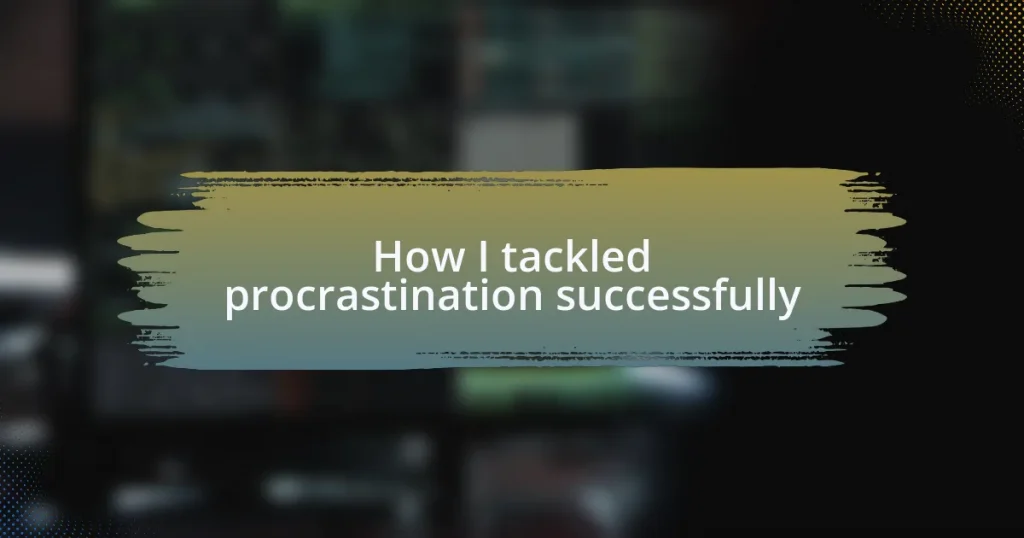Key takeaways:
- Procrastination often results from fear of failure, unclear goals, and overwhelming to-do lists, creating emotional stress.
- Setting realistic goals and breaking projects into manageable tasks boosts productivity and helps overcome procrastination.
- Incorporating a structured yet flexible work schedule, along with prioritizing tasks, enhances focus and efficiency.
- Utilizing strategies like the Pomodoro Technique and fostering a supportive environment significantly improves motivation and accountability.
Author: Charlotte Everly
Bio: Charlotte Everly is an accomplished author known for her evocative storytelling and richly drawn characters. With a background in literature and creative writing, she weaves tales that explore the complexities of human relationships and the beauty of everyday life. Charlotte’s debut novel was met with critical acclaim, earning her a dedicated readership and multiple awards. When she isn’t penning her next bestseller, she enjoys hiking in the mountains and sipping coffee at her local café. She resides in Seattle with her two rescue dogs, Bella and Max.
Understanding procrastination issues
Procrastination often stems from a fear of failure or perfectionism. I remember a project where I delayed coding a feature I’d been putting off for weeks, simply because I was afraid it wouldn’t meet my expectations. Have you ever found yourself in that position, staring at a blank screen, while self-doubt creeps in?
Sometimes, procrastination can feel like a comfort zone. I found myself scrolling through social media instead of tackling deadlines, convincing myself that I needed a break. It’s easy to trick ourselves into thinking we’ll get started “later,” but that moment of distraction can have a surprising hold over our productivity.
Moreover, the emotional weight of procrastination can lead to guilt and anxiety, creating a vicious cycle. I’ve often felt that sinking feeling in my stomach when deadlines approached, a constant reminder of tasks left undone. How do we break free from that cycle? Understanding our emotions tied to procrastination is crucial for finding effective strategies to overcome it.
Reasons behind procrastination
Procrastination often arises from a lack of motivation or unclear goals. I recall when I embarked on learning a new web development framework, only to find myself hesitating because I wasn’t entirely sure how it would benefit my projects. When the end game isn’t clear, it’s tough to muster the enthusiasm to even start.
Another significant reason can be our overwhelming to-do lists. There have been times when I looked at my daily tasks and immediately felt a wave of anxiety. It was easier to push everything aside than to confront the sheer volume of what needed to be done. It’s worth asking: how often do we paralyze ourselves with the notion of ‘too much to do’ instead of focusing on one task at a time?
Finally, the influence of external factors plays a substantial role. I remember sitting in a café, trying to concentrate on coding, but the loud chatter around me constantly distracted me. Immersed in an environment full of interruptions, I found it challenging to stay focused. Have you ever noticed how the atmosphere around you can either help you concentrate or, instead, fuel your procrastination?
Setting realistic goals for projects
Setting realistic goals for projects is essential to combat procrastination effectively. I learned this lesson while working on a personal portfolio website; initially, I set an ambitious deadline that left me feeling stressed and overwhelmed. It wasn’t until I broke the project down into smaller, manageable tasks that I found my momentum. Have you ever felt like the weight of a big project was too heavy? I know I have, and that’s why I prioritize setting achievable milestones.
Moreover, aligning my goals with my skills made a world of difference. I remember attempting to integrate complex animations into my site before I had the necessary experience in JavaScript. This not only slowed me down but also demotivated me. Ask yourself, are your goals stretching you just enough to challenge you without making you want to give up? I now take time to assess my capabilities, allowing me to set targets that are challenging yet attainable.
Lastly, visualizing progress can be a game-changer. When I started using a Kanban board to track my tasks, I noticed a significant boost in my productivity. There’s something gratifying about moving a task from ‘in-progress’ to ‘completed.’ Have you ever used a system like this? If not, I highly recommend it—seeing my progress laid out helped sustain my motivation and made the overall journey feel less daunting.
Creating a structured work schedule
Creating a structured work schedule transformed my approach to tackling procrastination. I used to sit down at my computer with a vague idea of what I needed to accomplish, which often led to wasted hours and half-hearted attempts. Then I started mapping out my day in blocks of time, dedicating specific slots for coding, design work, and breaks. This structure not only cleared my mind but also gave me a clear roadmap. Have you ever noticed how much more focused you become when you know exactly what to tackle next?
The real magic happens when you incorporate flexibility into your schedule. I learned this the hard way after rigidly sticking to my plan, only to find that interruptions would completely derail my productivity. So, now I build intermissions into my day. These short breaks allow me to recharge and return to my tasks with renewed energy. When was the last time you felt fully reenergized after a short pause? For me, it’s a crucial part of maintaining my overall efficiency.
I also find that prioritizing tasks based on urgency and importance helps keep me on track. Initially, I’d jump into whatever seemed interesting at the moment, which often led to missed deadlines. By using a simple priority matrix, I can categorize tasks and focus on what truly matters first. It’s such a relief to tackle those high-impact items early in the day—it’s like setting a solid foundation before adding more layers. How about you? Have you tried prioritizing your tasks, and how did it work for you?
Personal strategies for overcoming procrastination
One strategy that has worked wonders for me is setting achievable mini-goals. When faced with a large project, I often felt overwhelmed, which only fueled my procrastination. By breaking down the project into smaller, manageable tasks, I found it easier to take that first step. It’s amazing how much progress you can make when each goal feels attainable. Have you experienced that sense of accomplishment that comes from crossing even small tasks off your list?
Another effective approach is using the Pomodoro Technique, which involves working in focused bursts followed by short breaks. I’ve noticed that when I set a timer for 25 minutes of uninterrupted work, I am less prone to distractions. This method keeps my mind sharp and my focus intact. I’ve even developed a ritual around my breaks—sometimes I take a moment to stretch, sip a cup of tea, or simply step outside for fresh air. Isn’t it interesting how a simple routine can significantly boost your productivity?
Lastly, I’ve found that creating a supportive environment plays a crucial role in combating procrastination. Surrounding myself with positive influences, like supportive colleagues or inspiring resources, has motivated me tremendously. I remember when I joined a coding group; it transformed my perspective and pushed me to stay accountable. Do you have someone in your life who inspires you to stay on track? Engaging with such influences can be a game-changer in maintaining focus and momentum.
Reflecting on progress and adjustments
Reflecting on progress has always been a revelation for me. I recall a time when I dedicated a week to tracking my daily accomplishments, no matter how minor. Looking back at that log, I realized that each little step contributed significantly to my overall success, and it felt empowering to see how far I’d come. Do you ever take stock of your achievements? It doesn’t have to be grand to be meaningful.
Adjustments based on reflection are just as crucial. After noticing that some of my mini-goals were too ambitious, I made the necessary tweaks. For instance, instead of aiming to complete a module in a single day, I spread it across a few days. This change led to more sustainable progress and reduced my stress levels. Isn’t it fascinating how a slight modification can make such a difference in our productivity journey?
Moreover, reflecting on progress not only helps in identifying areas for improvement but also in celebrating victories. The other day, I paused to acknowledge that I had finally tackled a project feature I’d been avoiding for weeks. That moment of recognition motivated me to keep pushing forward. How do you celebrate your achievements, no matter how small? It can be the fuel you need to stay engaged and enthusiastic in your work.















